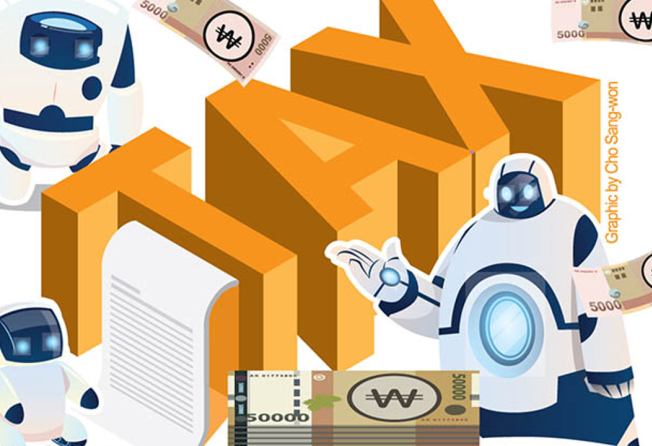South Korea takes first step to introduce ‘robot tax’
Tax revisions will reduce deductions for investments in automation

By Yoon Sung-won
Amid worldwide debate on the use of robots for work and possible consequent unemployment issues, the government made a first move that may help slow down automation in industries, according to sources, Monday.
In its recently announced tax law revision plan, the Moon Jae-in administration said it will downsize the tax deduction benefits that previous governments provided to enterprises for infrastructure investment aimed at boosting productivity.
Currently, enterprises that have invested in industry automation equipment are eligible for a corporate tax deduction. Companies can have part of their corporate tax between three per cent and seven per cent of the investment deducted under the policy, with the rate varying by the size of their business.
This sunset policy was scheduled to expire at the end of the year. But the government suggested extending it to the end of 2019 while decreasing the deduction rate by up to two percentage points.
The original definition of a robot tax is to levy tax on the use of robots for industrial automation. With more advanced and high-powered robots introduced at workplaces, human workers will naturally lose their jobs. In the meantime, the government will need more funds for welfare programmes amid the rising unemployment rate. The notion of a robot tax has been made to make up for the decreasing tax revenue on such a backdrop.
“Though it is not about a direct tax on robots, it can be interpreted as a similar kind of policy considering that both involve the same issue of industrial automation,” an industry source said.
There is no country that has officially adopted a robot tax yet. But governments, economists and technology experts have continued to argue about the pros and cons of such a tax.
Microsoft founder Bill Gates is one of the well-known advocates of a robot tax. In an interview this February, he said governments should levy a tax on the use of robots in a goal to fund retraining of those who lose jobs and to slowdown automation.
“For a human worker who does US$50,000 worth of work in a factory, the income is taxed,” Gates said. “If a robot comes in to do the same thing, you’d think that we’d tax the robot at a similar level.”
He also stressed that there are still many jobs that need human hands and minds and thus cannot be properly replaced by robots.
“What the world wants is to take this opportunity to make all the goods and services we have today, and free up labour, let us do a better job of reaching out to the elderly, having smaller class sizes, helping kids with special needs, all of those are things where human empathy and understanding are still very unique,” he said. “We still deal with an immense shortage of people to help out there.”
On the other hand, global organisations such as the International Federation of Robotics (IFR) have been strongly against the idea of collecting taxes on the use of robots, claiming the robot tax will undermine proper competition and technological innovation in the robotics sector.
Former U.S. Secretary of the Treasury Lawrence Summers also opposed the idea of taxing robots, calling Gates’ argument “profoundly misguided.”
“A sufficiently high tax on robots would prevent them from being produced,” he said.
In Europe, an argument for the introduction of a robot tax ignited last year when European Union lawmakers started work on a proposal to tax enterprises for their robots.
This February, however, the EU adopted a resolution that opposed the introduction of a robot tax, while officially categorising an artificial intelligence robot as an “electronic person” with a personality.